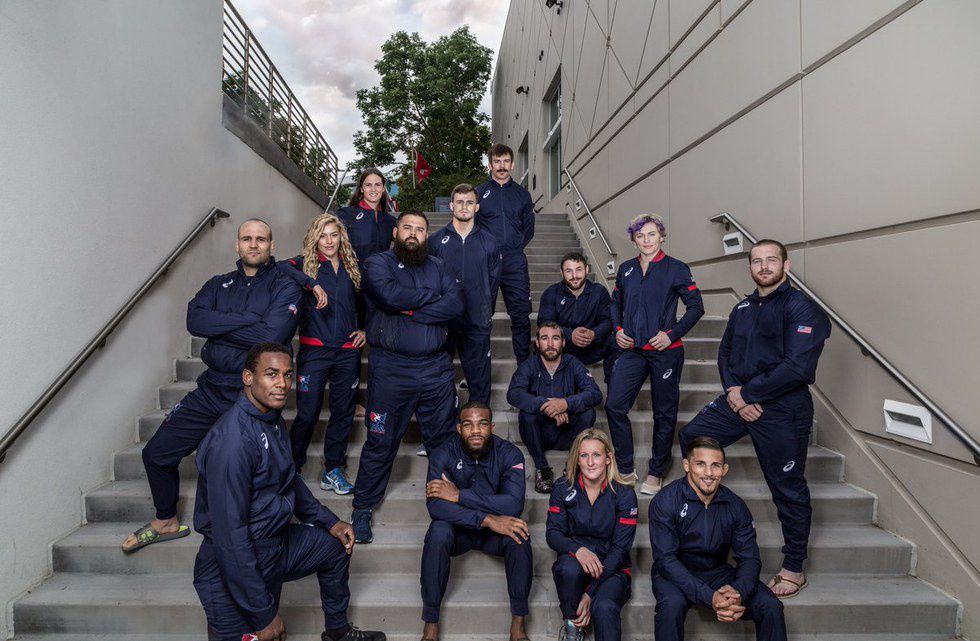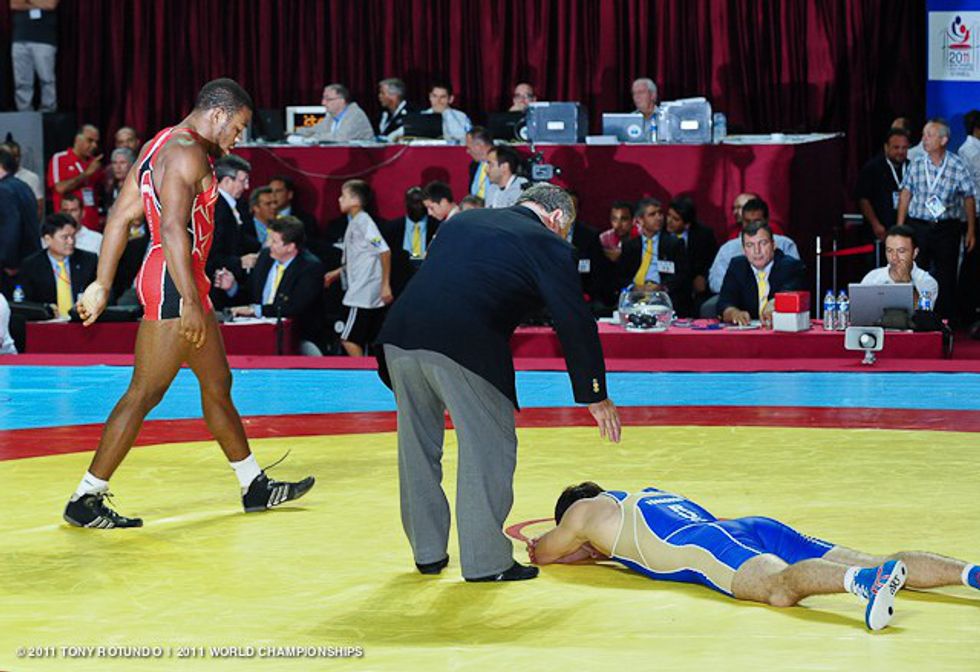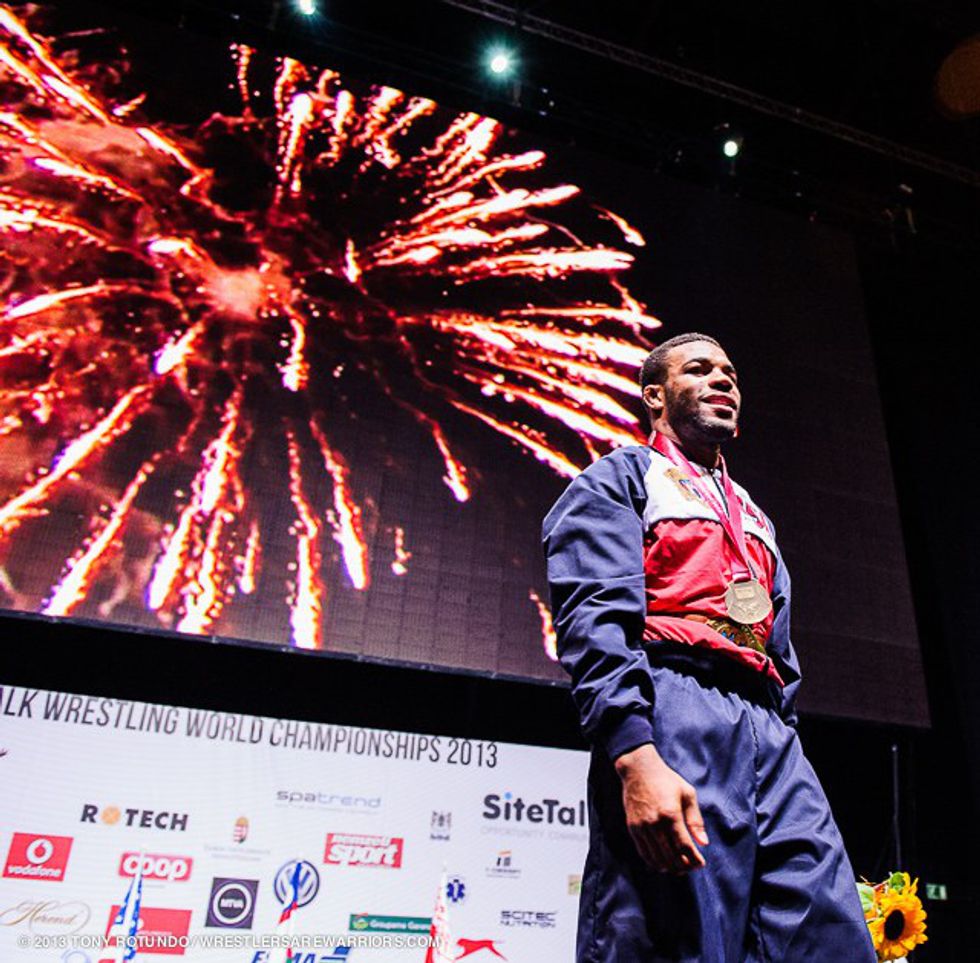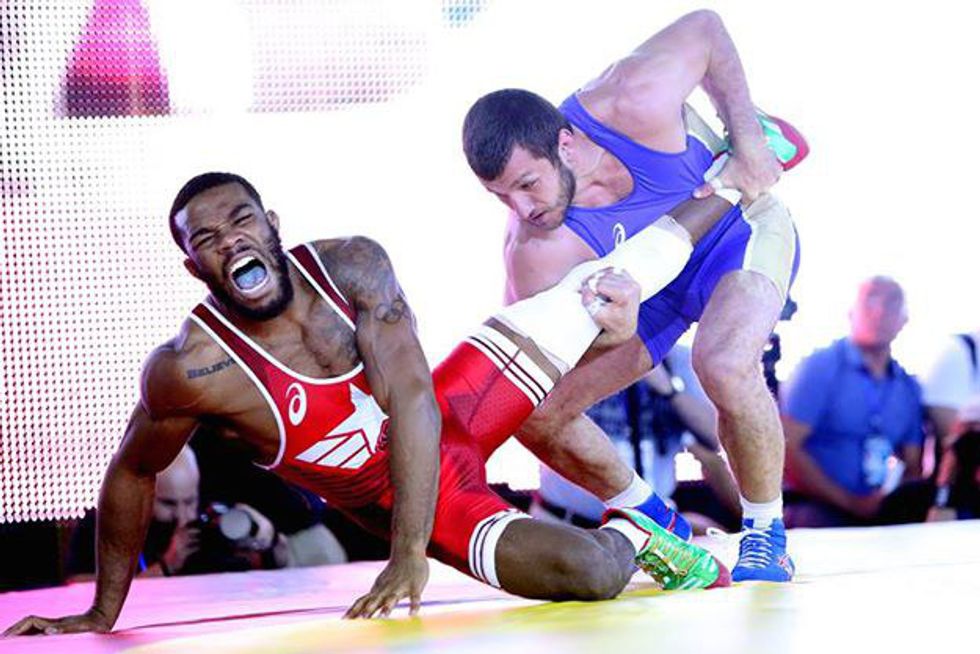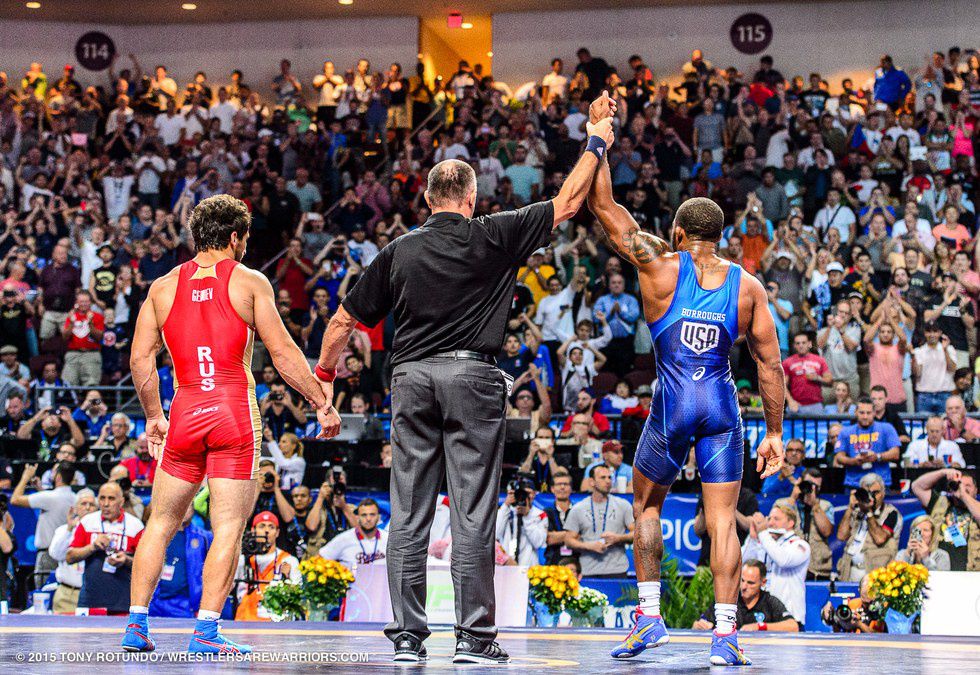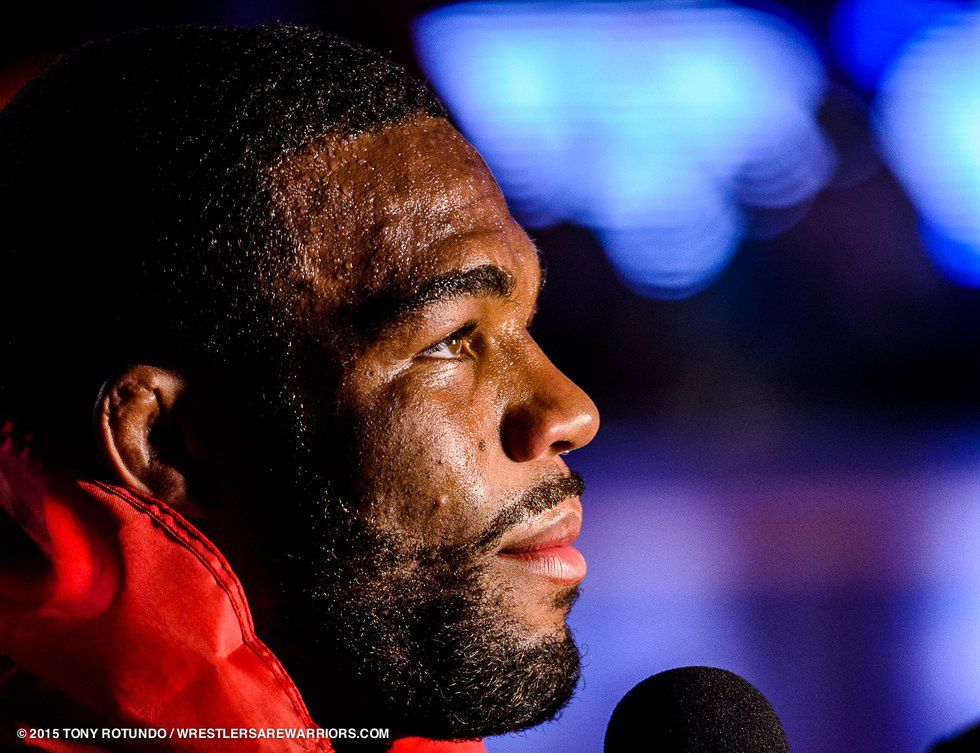Jordan Burroughs entered his second Olympic tournament as one of the greatest wrestlers in perhaps the most decorated weight-class in USAWrestling history. Prior to the 2016 tournament, Burroughs was one of only three men in the world to taste World/Olympic Gold since 2009 from the USA (in Men's Freestyle). With an 130-2 senior-level record, he carried with him a 100% medal percentage at the World/Olympic level since he debuted in 2011. Four World and Olympic titles. There was no regression to be expected, because the baseline for Burroughs was gold.
And then, he fell.
Carrying the World
You were ‘the greatest.’ Not to say that you aren’t now, but you were then. It was the Olympic Games, and you were the returning, defending World and Olympic Champion. Consensus World No. 1. No matter what happened with the rest of the team, you were a sure thing. Atlas “couldn’t” stumble; he “couldn’t” fall.
The Birth of a Titan
In 2011, I was still very, very new to the sport of wrestling. I had finished my first wrestling season with an injury that left me sitting at home for the first half of the year. That was when I discovered FloWrestling, which led me to one Jordan Burroughs. All I knew was he had beaten 2010 NCAA Champ Andrew Howe for the World Team spot and had established himself in the Twitter-verse as @alliseeisgold. The disciple of Mark Manning and Bryan Snyder out of the University of Nebraska, Jordan Burroughs manned the 74kg weight-class for TeamUSA, a weight that hadn’t seen medal production since 2006. By the time the World Championships came around (Sep ‘11), many US fans were interested to see how the relatively unknown-commodity on the freestyle circuit would do. Burroughs carried two NCAA titles with him to his first World meet and in the second round of the tournament, they would be tested against two-time defending World Champion Denis Tsargush of Russia, a man untouched for two years facing yet another young challenger .
As I watched, listening to Mark Bader’s fanatic-commentary (the above video is narrated by USAWrestling’s Gary Abbott), I became a believer. Tsargush threw everything in the book (and more) at you and you rose every time. In what would become the peak of Zeke Jones’s tenure as the Men’s Freestyle National Team Coach, a titan had jumped onto the scene and immediately challenged the best on the planet, scoring huge team points for the US. Tsargush was not the last to fall before the titan as he powered the United States back to international prominence.
The Titan’s Vision Quest
The year after his first triumph, the titan faced Iran’s Sadegh Goudarzi in London in the final for the second-straight year. A year out of collegiate competition, the man-turned-titan won himself an Olympic Gold Medal. Atlas had cemented himself to the World.
4x NCAA Champion Kyle Dake challenged you domestically in 2013.
A broken ankle during training camp before the 2013 World Championships couldn’t stop you from winning a third-straight World/Olympic title, and with the title came further evidence of your invincibility.
You had stormed onto the scene and immediately began felling giants with your mastery of the craft. During 2014, another legendary-collegian, 4x NCAA finalist and 2x Dan Hodge trophy winner David Taylor, sought to test his mettle against you and wanted to knock down one of the best wrestlers living. You responded with bringing your game to higher level, within minutes.
And so Atlas entered his fourth Worlds as the stalwart of a nation’s wrestling team. He was the first World Champion since 2006 for US Men’s Freestyle (save Henry Cejudo’s Olympic Gold in 2008). He was the first repeat World/Olympic Champion since Kurt Angle in 1995/96. With his unmatched domestic and international dominance, Atlas was untouchable. Or so it seemed. A knee injury would force our titan to stumble for the first time on the world stage. In the world semi-final, Atlas faced his first rival yet again. Denis Tsargush was hungry for World Gold after three years away from the top of the mountain, and smelled the vulnerability on the titan, the Achilles’ heel a heavily-wrapped, visible target. It was the first time he was outright bested on the highest level. Despite the loss, you would break your final opponent for a World Bronze medal.
With the stain of defeat fresh on his mind, Atlas trained ever harder to return himself to hallowed ground upon healing his wounds. Dake dared to challenge him again.
As fate would have it, the site of redemption would be Las Vegas, Nevada, fronting Atlas a home-field advantage. In his way, in the semi-final, would be another contender from the Russian ranks, one Anuiar Geduev, who instantly became another rival of the titan on his long journey.
"But today I'm a World Champion." —Jordan Burroughs
— The Quoter (@WrestlingQuoter) September 13, 2015
The win over Geduev catapulted Atlas once again to the ultimate victory on the world stage, this time in his native country. For another consecutive year, he added to his bounty of rare medals. Our captain had found redemption and, in the year prior to the Olympic Games, looked to be a lock to achieve his fifth World/Olympic title, again invulnerable to mortals.
The Cruelest Mistress
Even titans don’t ever fully control their wrestling destiny. Many variables (from stylistic match-ups to individual calls) must align for glory to be attained. Stepping onto the Olympic mat, Atlas appeared poised to climb back up the mountain. Hershey’s, Chobani, Polo Ralph Lauren gravitated toward your greatness, seeing opportunity in your prominence. The face of a program, you had more than “a chance,” because you were a sure thing. With every victory, success, and triumph, a titan earned himself the world. With his success came the weight of gold -- and the weight of the world. Suddenly it was no longer your own legacy you were forging, but the legacy of an entire nation and sport. You had carried it willingly for five long years at every opportunity, but even the strongest men feel fatigue. Few hold the world at their command, fewer hold onto it long enough to have the gravity of its weight bring them to their knees.
But, as the saying goes, "everybody loses.” It was an early lesson from wrestling that I, and many others, learned. Even Dan Gable lost. In 2014, a loss was just that, a single-loss. Atlas, injured, still found himself among the final standings, then. In 2015, he had proven his elite-level yet again, vanquishing the demons of doubt from 2014. We were back on track. Anuiar Geduev returned for another attempt at Burroughs. Iran’s young star Hassan Yazdanicherati dared to enter the arena, with his eyes toward the titan. They would fall like the giants before them. Atlas was not going to lose, not on this stage. Not on his hallowed ground. Well, the cruelest mistress had different plans.
In his first match of the 2016 Olympics, Atlas faced a familiar opponent in Augusto Midana of Guinea-Bissau. It was Midana that had chipped the armor in 2014, damaging the knee of the titan in the tournament’s first round (a turning point that derailed a potential fourth-straight title). This was the first sign of the mistress’s handiwork.
The titan survived the first engagement rather unscathed, advancing to the next round against an invigorated Geduev. On the Olympic mat, a titan fought with all his might as wrestling, in its insatiable greed, hoarded his brilliance.
In a flash, he had lost. The titan had fallen. The leader of the US men’s freestyle team. World Ranked No. 1. Defending World and Olympic champion. Afterthoughts, now.
Perhaps it would have been better if the repechage system had spared Atlas and his supporters another defeat, but the cruelest mistress hadn’t had enough just yet. The sport was hell-bent on making the fall as painful as possible, in the way the titan was accustomed to: double elimination. And it questioned his pride in his weakest moment.
Bekzod Abdurakhmanov of Uzbekistan (and a collegian in the US) met a hollow Atlas in the repechage. A one-time D1 All-American stood across from a 2x D1 champion. A 2014 World Bronze at 70KG challenged a 4x World/Olympic Champion with a 2014 World Bronze, all at 74KG. Wrestling dared the titan to rise again. As he stood in front of an onslaught, he suffered his worst defeat to date, a technical fall. Only then was the sport ready to let him go.
Like the long line of wrestlers before him, even the titan found himself the underbelly of an arena, distraught with anguish. Too often the defining-moment is too fleeting, the resounding-defeat too final. On your worst day, it became apparent that we had taken your legendary results for granted. Even wrestlers could be fanatical to the point of temporary-amnesia to the true nature of wrestling. Our faith in your ability has not waned and, in fact, our marvel for your reign as the world’s best for the better part of a quadrennium has increased. You are already super-human.
Video: Burroughs speaks with media after Olympic elimination
"The one who doesn't fall, never stands up." —Fedor Emelianenko https://t.co/jSpe0J3Ch8
— The Quoter (@WrestlingQuoter) August 21, 2016
Afterword
“I’ll be a World Champ again,” Jordan Burroughs told USAWrestling’s Richard Immel on the Bonus Points podcast, several weeks after the end of the Rio Olympic Games, several weeks after his hardest day. Only then was I able to shake off the memories of his losses at the tournament. “It was a bad day to have a bad day” sums up the event now. The face of the US Men’s Freestyle program since 2011 was suddenly very human and vulnerable. While the likes of Kyle Snyder and J’Den Cox will hoist the burden of a world team, Burroughs will recover mentally and physically. He will prepare.
And he will return. His legacy is a bright streak in the long line of 74/76KG American Champions. Through his skill and dependability, Burroughs cemented himself as one of the greatest in American history regardless of weight-class or style… alongside the likes of Stan Dziedzic, Lee Kemp, Kenny Monday, Dave Schultz, Brandon Slay and countless others.
Burroughs continues to chase Bruce Baumgartner (thirteen World/Olympic medals in fourteen appearances, five World/Olympic Gold medals) and John W. Smith (six consecutive World/Olympic Gold medals), but is firmly in a tier of his own in the annals of American wrestling with his four World/Olympic Gold medals. He is still evaluating his course through this embittering sport, but has always projected to go through the 2020 Tokyo Games.
Further Reading:
My Journey to World Championship #3 by Jordan Burroughs
American wrestling. A superpower off-course. How do we get back? by Jordan Burroughs
Dear Wrestling by Jordan Burroughs
‘Something good will come out of this’: Jordan Burroughs post-Olympic tournament press conference




